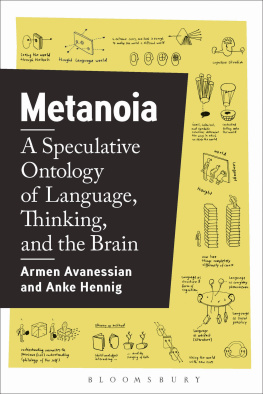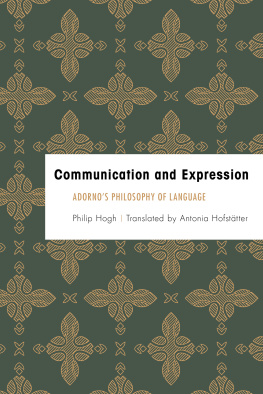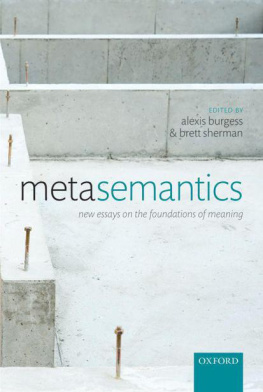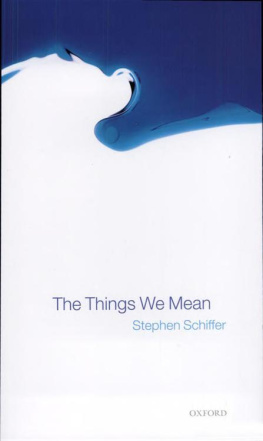
Barker, Stephen J , Department of PhilosophyUniversity of Nottingham
Renewing Meaning
A Speech-Act Theoretic Approach
Print ISBN 0199263663, 2004
doi:10.1093/0199263663.001.0001
Abstract: This book develops an alternative approach to sentence- and word-meaning, which I dub the speech-act theoretic approach, or STA. Instead of employing the syntactic and semantic forms of modern logic-principally, quantification theory-to construct semantic theories, STA employs speech-act structures. The structures it employs are those postulated by a novel theory of speech-acts. STA develops a compositional semantics in which surface grammar is integrated with semantic interpretation in a way not allowed by standard quantification-based theories. It provides a pragmatic theory of truth, a treatment of logically complex discourse as expressive cognitive states, and a background metaphysics in which the world is a totality of logically simple states of affairs. The book also puts forward an account of how intentional states provide the simple, representational foundation for a superstructure of speech-act structures-a system of thoughts-that far outruns the expressive power of the intentional foundation. In short, it provides an account of cognitive foundations of a language and a naturalistic reduction of semantics through an expressive theory of semantic norms.
Keywords: compositional,expression,intention,pragmatic,proto-act,pronoun quantification,speech act,truth,representation
end p.ii
Renewing Meaning
A Speech-Act Theoretic Approach
CLARENDON PRESS OXFORD
end p.iii

Great Clarendon Street, Oxford ox 2 6 dp
Oxford University Press is a department of the University of Oxford.
It furthers the University's objective of excellence in research, scholarship,
and education by publishing worldwide in
Oxford New York
Auckland Bangkok Buenos Aires Cape Town Chennai
Dar es Salaam Delhi Hong Kong Istanbul Karachi Kolkata
Kuala Lumpur Madrid Melbourne Mexico City Mumbai Nairobi
So Paulo Shanghai Taipei Tokyo Toronto
Oxford is a registered trade mark of Oxford University Press
in the UK and in certain other countries
Published in the United States
by Oxford University Press Inc., New York
Stephen J. Barker 2004
The moral rights of the author have been asserted
Database right Oxford University Press (maker)
First published 2004
All rights reserved. No part of this publication may be reproduced,
stored in a retrieval system, or transmitted, in any form or by any means,
without the prior permission in writing of Oxford University Press,
or as expressly permitted by law, or under terms agreed with the appropriate
reprographics rights organization. Enquiries concerning reproduction
outside the scope of the above should be sent to the Rights Department,
Oxford University Press, at the address above
You must not circulate this book in any other binding or cover
and you must impose this same condition on any acquirer
British Library Cataloguing in Publication Data
Data available
Library of Congress Cataloging in Publication Data
Data available
ISBN 0-19-926366-3
1 3 5 7 9 10 8 6 4 2
end p.iv
end p.vi
PREFACE
Frege created a paradigm that is centrally important to how meaning was understood in the twentieth century. It includes the now familiar distinctions of sense and force, of sense and reference, of concept and object, the conception of sentence-meaning as residing in truth-conditions, and the view that semantics is a normative enterprise distinct from psychology. Most importantly, it proposes that the syntactic and semantic forms of modern logic, quantification theory, underpin the meanings of natural-language sentences. Frege's paradigm might seem to be a permanent fixture in semantic theory. Nevertheless, in this book, I undertake to overthrow it. I offer an alternative that rejects the sense/force distinction, truth-conditional semantics, anti-psychologism, and, most importantly, the idea that quantification theory has anything to do with the structure of reference and generality in natural languages.
The framework I describe is a speech-act-based approach to meaning in which semantics is entirely subsumed by pragmatics. I call this framework the speech-act theoretic approach, or STA. In STA, meaning resides in syntax and pragmatics; the familiar creatures of semantics, such as propositions or truth-conditions, have no role to play in semantic theory. STA conceives of sentence-meanings not as propositions but as speech-act types. It conceives of word-meanings not as objects, functions, or properties, but again as speech-act types. Pragmatic phenomena one would expect not to figure in semantics, such as pretence, enter into the logical form of sentences. STA offers a compositional semantics by showing how speech-act types combine together to form complex speech-act types. Moreover, the syntactic structures that STA invokes are not those of quantifiers, open sentences, variables, variable-binding, and so on. Rather they are structures specific to speech-act forms. This new kind of syntax explains why surface grammar has the form it does, and views logical form as closely aligned with itan explanatory virtue lacking in standard treatments.
Isn't a speech-act approach doomed to circularity? It appeals to speech acts. These are underpinned by intentions, and intentions have contents, which in turn must be explained by semantics. My reply to this charge is that intentions have contents, but they are of a different and more primitive kind than the contents of thoughts. The relation of intention to fully-fledged thought is that intentional states provide the simple, representational foundation for a superstructure of speech acts and modesa superstructure that far outruns the expressive power of that foundation. In STA, semantics is a branch of psychology: psychology and semantics cannot be prized apart. How do we account for the
end p.vii
normative aspect of meaning? STA proposes an expressivist reduction of the normative. The word is prior to norms; norms are not prior to words.
In outline then, according to this book, a natural languagea system of thoughtis an emergent entity that arises from the combination of simple intentional structures, articulated symbolic media, and certain non-representational cognitive states. It is embedded in, and part of, a world devoid of normative facts qua extra-linguistic entities. The system's structures have little in common with those found in formal languages based on Frege's paradigm. Finally, the world, in which the system is embedded, is a totality of particular states of affairs. There is no logical complexity in re; the world contains mereological complexity only.
Some of the core structural proposals for this book emerge from my Ph.D. thesis, submitted in 1995 at the University of Melbourne. But there have been many developments since then. I would like to thank the following people who have helped me in many and varied ways: John Bigelow, Thomas Bull, Phil Dowe, Maite Escurdia, Karen Green, Allen Hazen, Richard Holton, Lloyd Humberstone, Terry Horgan, Max Klbel, Bill Lycan, Oskar Manhal, Samir Okasha, Graeme Oppy, Graeme Rhook, Rupert Sumerton, Mario Gomez Torrente, Elvira Schnabel, Brian Weatherson. I owe a particular dept of gratitude to Patrick Emerton, with whom I have engaged in a lot of discussion about the contents of this book, and other things besides, and who read earlier drafts of this work. I thank two anonymous OUP readers for their comments, the OUP Philosophy editor, Peter Momtchiloff, and Rebecca Bryant and Hilary Walford. I thank John Gorvett, who read through the final draft of this work. I gratefully acknowledge the support of UNAM, where I was a postdoctoral fellow, and the Australian Research Council for support at Monash University, where I was a postdoctoral fellow, and at the University of Tasmania. I thank the Department of Philosophy at the University of Nottingham for their support. I thankfully acknowledge Kluwer Academic publishers for permission to reproduce sections of 'E-type Pronouns, DRT, Dynamic Semantics and the Quantifier/Variable-binding Model',










